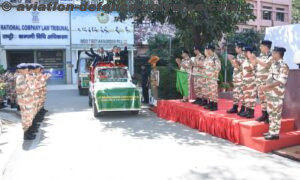New Delhi. 26 December 2019. Minister of State for Home Affairs, Nityanand Rai, recently inaugurated a State-of-the-Art DNA Analysis Centre at CFSL, Chandigarh. This new Advanced Forensic DNA Analysis Lab has been set up under the Nirbhaya Fund scheme, with an allocation of Rs.99.76 crores. This Centre will provide State-of-the-art facility for (i) Sexual Assault and Homicide Unit (ii) Paternity Unit (iii) Human Identification Unit and (iv) Mitochondrial DNA Unit. DFSS has ensured that this Centre is fully equipped with modern DNA Profiling tools and equipment. This Advanced Forensic DNA Analysis facility has a capacity of examining 2000 cases per year.
Speaking on this occasion, the Minister emphasized that all States and Union Territories utilize this facility as well as set up similar facilities in their respective States for quick disposal of forensic cases referred to them. This will facilitate a modern, responsive criminal justice system. However, he requested that everyone should work towards creating a community where crimes against women are not tolerated and such cases should not take place at the first instance. Rai also stated that a specialised training in collection of forensic evidence is being undertaken by Bureau of Police Research and Development (BPRD) and more than 6000 personnel have been trained.
Rai said that the Government has accorded highest priority to women safety in the country, and apart from introducing stringent penalties in law, several measures which have been initiated in this regard, include operationalization of 112 universal emergency services in 28 States/UTs, commencement of ‘Safe City’ projects in 8 large cities, and strengthening State Forensic Science Laboratories. MHA would be setting up of Women Help Desks in all Police Stations and setting up Anti- Human Trafficking Units in all Districts.
DNA Analysis has become critical in ensuring timeliness and efficiency in completion of criminal investigation as well as better convictions. Forensic DNA Profiling is a very sensitive and reproducible technique that has become one of the most valuable tools in modern criminal investigation such as human identification in mass disasters, paternity and maternity disputes, identification of victim and suspect in rape and murder cases, child swapping in hospitals, identification of deceased, organ transplantation and immigration.
The Directorate of Forensic Science Services under the Ministry of Home Affairs (MHA) has set up Central Forensic Science Laboratories (CFSLs) in the country. These are situated at Bhopal (Madhya Pradesh), Chandigarh, Guwahati (Assam), Hyderabad (Telangana), Pune (Maharashtra) and Kolkata (West Bengal). Apart from assisting States in undertaking forensic examination of evidence, the predominant role of CFSLs is to undertake R&D activities with a view to develop new forensic techniques, adopt the latest developments in basic sciences for forensic analysis and disseminate this information to the other Forensic Science Laboratories.
About 200 invitees including Directors of Central and State FSL from the entire country, Senior Police/Judicial Officers, Professors, Doctors from various Universities/Hospitals, Senior Officers from the scientific organizations participated in this event.





























































































































